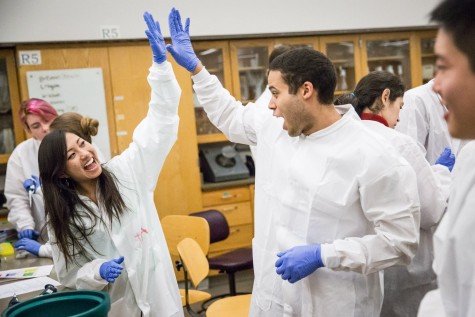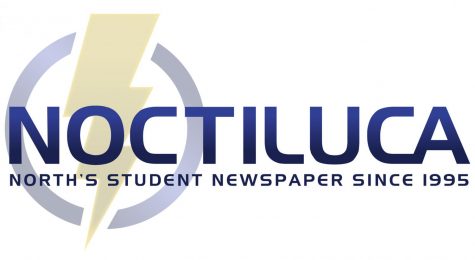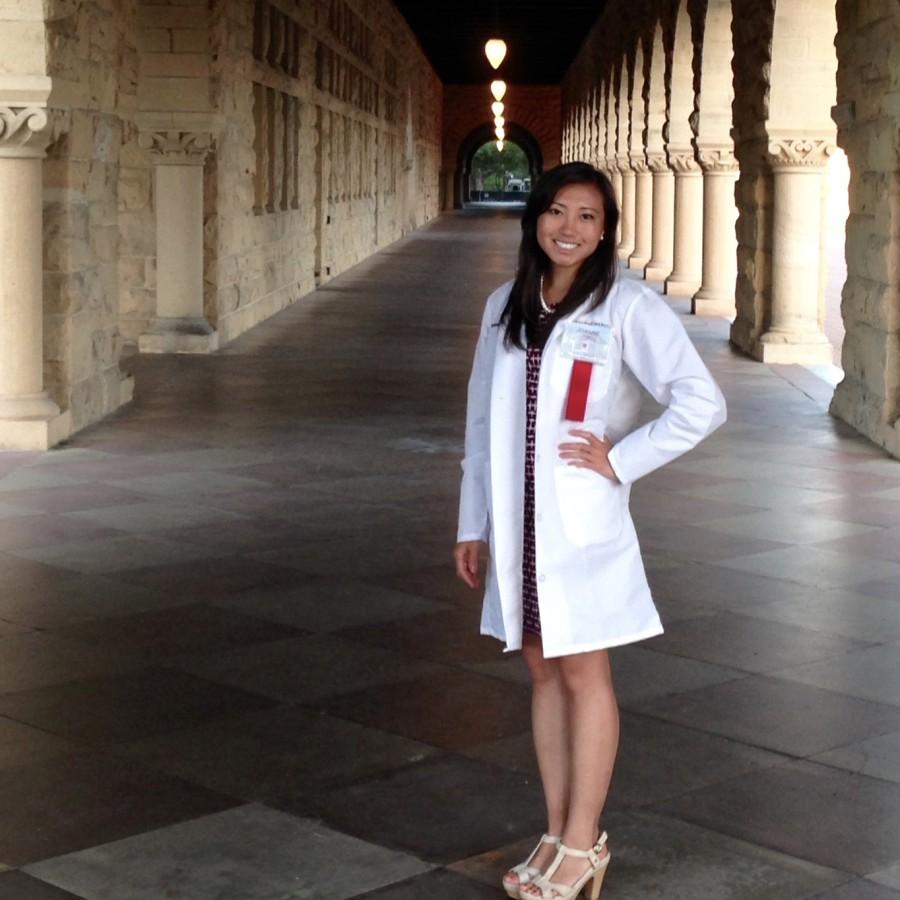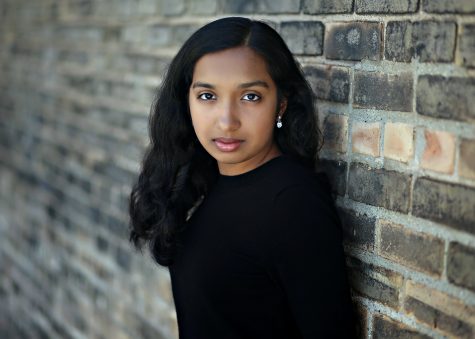Where are they now: Joanne Zhou, Class of 2011
Joanne Zhou, at the Stanford School of Medicine.
September 27, 2015
For Joanne Zhou, graduate from the Class of 2011, the road from North led to MIT, and then to Stanford. The Noctiluca caught up with her to see what she’s been up to since she left North.
Noctiluca: What are you currently doing, as far as schooling and research?
Zhou: I am currently in my first year at [the] Stanford School of Medicine. I just finished my undergraduate degree at the Massachusetts Institute of Technology. I took a lot of classes in neuroscience and biology there, in preparation for entering medical school. I also worked in the lab of Susumu Tonegawa [a professor at MIT who won the Nobel prize in medicine in 1987] for four years and conducted research on memory manipulation using a technique called optogenetics. My senior year, I worked on a team to study how we can use light to artificially activate pre-labeled positive memories to better understand the neurobiology of depressed individuals. We showed that chronic artificial activation of positive memories could help to reduce depressive behaviors in our mouse models while exposure to what would normally would be positive stimuli didn’t.
N: What classes did you take at MIT?
Z: At MIT I took a lot of pre-med required classes like chemistry and biology. Besides that I took a couple Asian cultural classes, so that I could do a summer internship in China. I took health policy, political science, microeconomics, as well as some design classes just for fun. These classes helped me prepare for the MCAT while also helping me explore intersections of medicine with other disciplines.
N: What was your favorite subject at MIT?
Z: I really liked all of the subjects at MIT, but I especially loved neuroscience and biology. There were a lot of labs in those classes and it was nice having a hands on approach to items. Participating in research under Professor Tonegawa helped me learn a lot about neuroscience and translational research in general.”
N: What extracurriculars did you do at MIT?
Z: I served on the MIT Class of 2015 Council for 4 years, and served as Class President my senior year. It was a position devoted to bringing my class together and advocating on behalf of the senior class and undergraduates to MIT administration. As Class President, I negotiated a budget to help fund undergraduate activities, and help put on events to congregate our class. We planned formals, wellness events, workshops, outings, group dinners, and a lot more!
I also got to publish my research in Tonegawa’s lab and I served as a TA for a biolab class at MIT.

N: What was the most exciting thing you did at MIT?
Z: I was part of the Global Poverty Initiative for 3 years and served as Co-Pres my senior year. This program helps to engage the MIT community in fighting poverty on a worldwide scale. I started the International Development Hackathon, a major event that is co-hosted by the Global Poverty Initiative. The International Development Hackathon solicits projects from NGOs and government organizations operating in the international development space as the basis for projects during the Hackathon, and bring together collegiate programmers to develop software/apps to help meet the needs of these organizations in 24 hours.
N: What was an experience you had in MIT that helped you explore the area of entrepreneurship and medicine?
Z: Before I graduated from MIT, I interned at the Department of Health and Human Services in the internal consulting branch, the Office of Business Management and Transformation. While there I was able to apply the process of interdisciplinary collaboration I learned at MIT in the context of policy. I worked with the IdeaLab and HHS Open Innovation Manager to help visualize that data so that patients, providers, payers, and legislators could make better informed decisions. To accomplish this task, we designed and launched a 3-month prize competition called The HHS Viz Risk Challenge (Visualizing Behavioral Risk) to unite federal agencies, programmers, and public health experts with the untapped vigor of concerned citizens in creating innovative software and infographics. It was an incredible opportunity to delve into the healthcare challenges currently facing our nation, and I was fortunate to be able to take ownership of this project and really draw upon my experiences at MIT in making this Challenge. I developed an appreciation for the power of open data, open innovation, and open government, and got to be part of the movement towards an increasingly transparent, accessible, and tech-savvy government.
N: What was hard about college?
Z: It was very important for me to understand that I had to maintain discipline for myself. There are a million activities going on at one time, so it’s important to say no to joining way too many activities. I’m the kind of person who wants to get involved in everything, so it’s hard for me to say no, but eventually I have to understand that I can’t do everything at one time. I learned (and am still learning) how to focus on just a few things so that each get my full attention.
N: How was the transition from high school to college?
Z: The transition from high school to college wasn’t the easiest for me. A good number of my peers came from high schools whose curriculums were more rigorous than what I was used to. Overall I learned a lot about myself, such as how to maintain confidence in tough situations, and also continue working hard no matter what. I learned that you should always think outside of the box, and continue learning about items that are new and interesting to yourself instead of staying in your comfort zone.
N: What was your favorite subject in high school?
Z: I really enjoyed the AP classes at North! I’ve got fond memories from AP World, APUSH, AP Literature and Comp. AP Chemistry and AP Calc were fun too. I’m kind of a nerd when I say this, but I really loved all of the classes I took at North.
N: What classes did you take in high school that helped you become prepared for college?
Z: APUSH helped me learn to balance my time wisely. There were a lot of essays and readings and I had to be able to do APUSH assignments in a sufficient way as well as also complete my other homework just as well. AP World was a lot of memorizing. It was a lot of recalling on the AP exam which helped with learning how to memorize essential items in my future Biology classes. I loved AP Chem and AP Bio since that was a lot of science which is helping me now. I also love AP Literature since that helped with my college essays as well as improving my writing.
N: What activities did you do in high school that helped you become prepared for college?
Z: I played piano, I swam for Appleton North, I played violin in youth symphony, as well as the orchestra at school, and was involved in the AYEI. These activities helped me stay well rounded, but at the same I got to meet new people and make lasting friendships.
N: How was your high school experience — would you change anything that you did in high school?
Z: I was very happy with my high school experience. I just wish I did a little bit of thinking “outside the box.” For example, I wish I took some time to do labs with other professors during high school. Many incoming freshmen at MIT participated in research with professors during their summers in high school. Other than that, I am truly happy with the time I spent at North!
N: Who or what inspired you to go into the medical field?
Z: It has honestly been a long journey for me so far. I have always wanted to be a doctor when I was little, since I have a family background in medicine. I want to be able to change lives for the better since I am so passionate about helping people. I love the sciences, especially biology; that was one of my favorite classes in high school.
I realize that I still have a long journey ahead of me, almost ten years still, but I’m determined to fulfill my dreams.
N: What are you future goals and aspirations after medical school, and beyond?
Z: At this point, I am still not sure what I want to be doing after medical school. I really do want to be a clinician, since I really enjoy seeing patients and treating them and helping them with whatever problems they may have. I am truly passionate with helping people. At the same time, I’m exploring the research as well as how I can incorporate entrepreneurship with medicine.
N: What advice do you currently have for high school students who are aspiring to become doctors?
Z: My advice would be to continue exploring the medicine area. You don’t have to declare right away that you want to be a doctor in high school, you have plenty of time to really see if you’re passionate about the area. You should shadow local doctors, read books written by doctors and read how they treat their patients. Having lab experience with professors is definitely a plus before going into college so that you are used to how a college lab goes when you start your first year in college. Volunteering in a hospital is also nice, especially so you can get used to the patient-doctor environment that you will be encountering as a medical student and beyond. Some people take a year off in between undergrad and the start of medical school, since they really want to be sure that they want to go into the journey of medical school before they start paying the tuition. I think it’s important to not be afraid of the journey you are about to embark on. There are several options to follow, especially if your first one doesn’t work out. The important thing to remember is that as long as you love something, and you are passionate about what you want to do in the future, no one will be able to stop you from pursuing your goal as long as you persevere and stay confident throughout the whole process.



